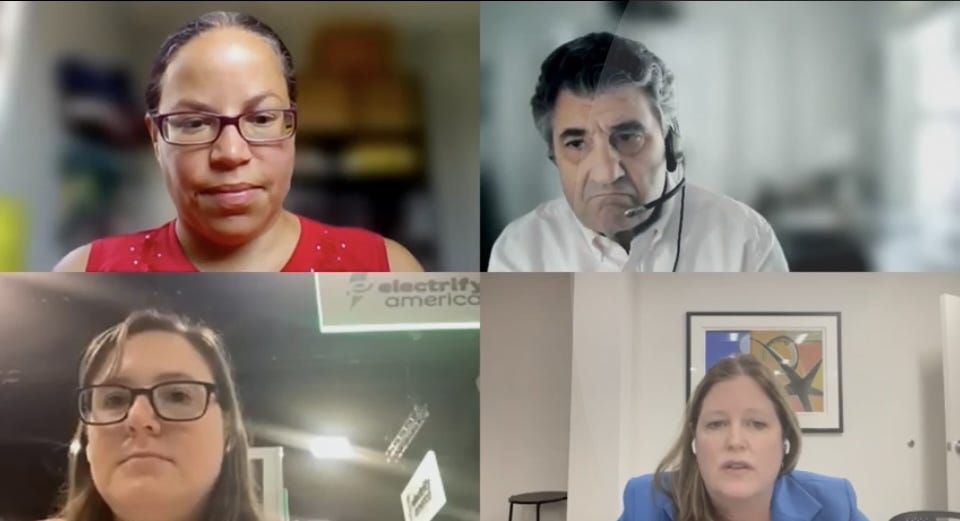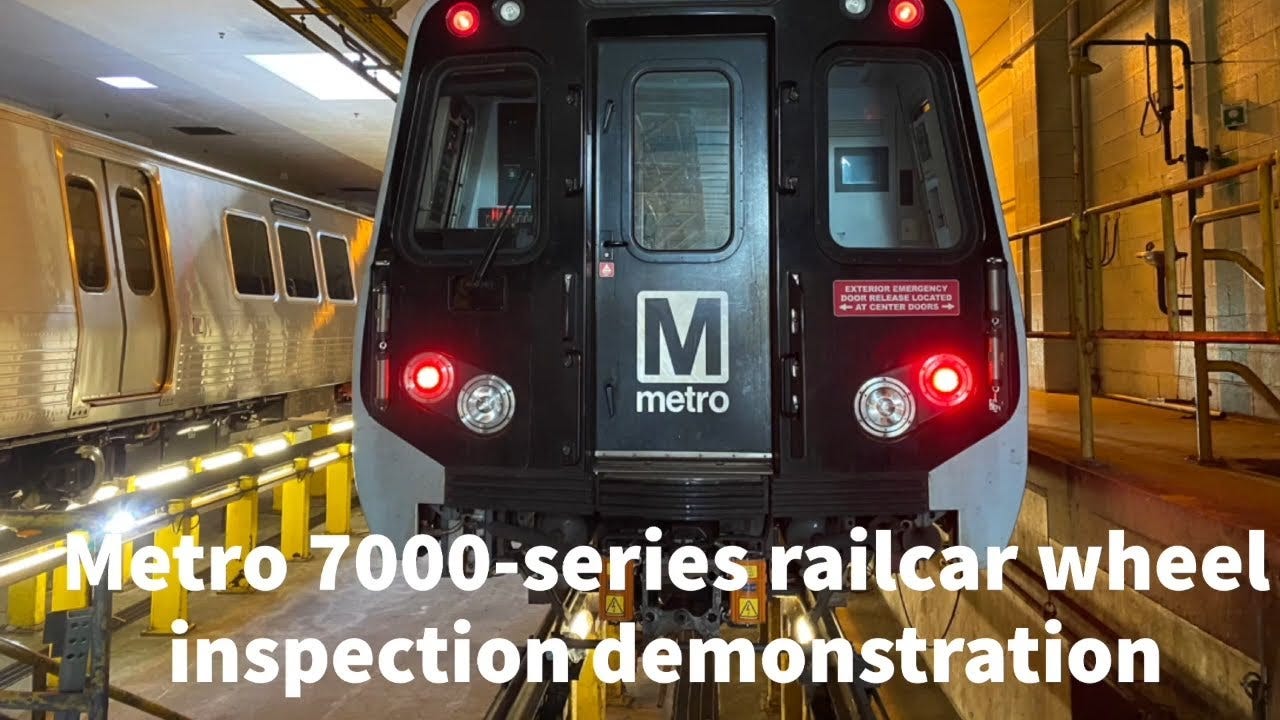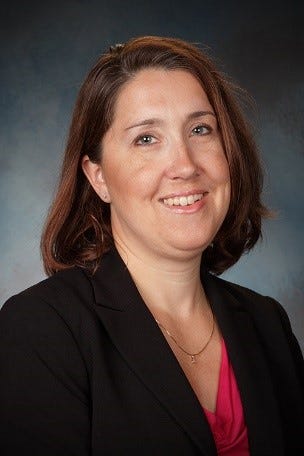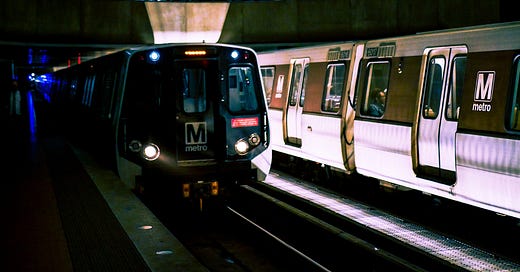MetroNow Dispatch 7.2022
In this month’s Dispatch, we highlight the new Metro GM, budget shortfalls, the transit-road-safety double standard, drops in the “kids ride free" program, and congratulate Jennifer DeBruhl.
Welcome to New WMATA GM

WMATA’s incoming GM Randy Clarke started today, July 25th. Clark will join Metro at a pivotal moment, the organization faces a myriad of challenges bridging management issues, safety concerns, an impending budget shortfall and delayed or reduced service. MetroNow believes that despite these substantial challenges, progress is possible. Especially when decision makers collaborate to solve problems.
Clarke will have to hit the ground running to ensure WMATA can deliver on its mission to provide the public with an efficient, frequent, affordable and safe means of travel throughout the region. At MetroNow, we think that must include:
Strategic reform to improve accountability, responsibility, and safety across the organization.
Working with the WMATA Board to enhance communication, capacity, and effectiveness of oversight and planning.
Creating a strategy to improve service in the short, medium, and long-term.
Building regional consensus around a strategy to address the fiscal cliff.
That is… a lot! But, to ensure progress, Randy Clarke must bring new energy and vision for this critical regional asset. At a May press conference, Clarke committed to ensuring a high standard of operation under his leadership, “As a fellow transit customer, I will be focused on delivering the safe, reliable, and customer centric transit service that this region deserves. I look forward to meeting with staff, customers, stakeholders and community members to learn more about how we can collectively build a bright future together.”
MetroNow looks forward to Clarke’s arrival and urges his forthcoming administration to work swiftly in the coming months to implement much-needed improvements to the organization. We are committed to working with Randy, our elected leaders, and partners around the region to collectively lean in and ensure WMATA’s long-term success.
Read More:
New Metro GM faces safety, financial challenges on first day (WaPo 7.25.22)
“Clarke on Monday said his priorities will be improving service frequency and ensuring customer safety ahead of addressing longer-term goals, such as finances and the agency’s business model. “Crawl, walk, run," he said. “We’ve got to get service back to a reliable, frequent level that everyone can rely on and be really proud of.”
New Metro CEO Randy Clarke starts today (Axios D.C. 7.25.22)
“While Clarke’s got a mountain of Metro problems to climb, colleagues from around the country believe he’s equipped for the challenge.”
A few 7000-series trains are back — but there could be more (GGWash 7.11.22)
“Through July 6, MetroHero founder James Pizzurro says Metro has run just under four trains on average each weekday between 6 am and 10 pm, well below the eight allowed. The graphic above includes weekends, when Metro hasn’t been running the new trains, and shows a lower average value.”
Paper record confusion causes Metro to recertify all rail traffic controllers (GGWash 7.06.22)
“The WMSC says that Metro’s ROCC Director, Ed Donaldson, discovered “discrepancies with recertification dates” while investigating why some RTCs did not have current, valid certifications. The discovery led Donaldson to trigger a recertification of all RTCs, a process that Metro told the WMSC is expected to be completed by July 31.”
Next Stop, Fiscal Cliff; $356 Million Shortfall Expected in 2023
*This section was updated on 7/26*
During the pandemic, many operators experienced steep declines in farebox revenues. Emergency funding from the federal government helped to shore up budgets and keep transit agencies running, but that federal relief will soon dry up. Large transit agencies across the country, WMATA included, will need to identify ways to strengthen revenue to avoid the death-spiral of service cuts.
Farebox Recovery Ratio*
MTA, New York: 34%.
LACMTA, Los Angeles: 17%.
CTA, Chicago: 30%.
SFMTA, San Francisco: 12%.
NJTransit, Newark: 34%.
*Total fare revenue / total operating expenses, 2019.
In 2019, while passenger revenues made up 90.5% of Metro’s total $784.6M operating revenue, they only covered 38% of the total operating budget. The remainder was paid for with $73.9M in non-passenger revenues, such as advertising, and more than $1 Billion in subsidies. The impending budget deficit, on top of the current management crises, requires bold thinking and action by the Board and new GM. Restoring public confidence through strong management actions and reconfiguring service to adjust to reduced peak hour work travel – i.e. providing more frequent and reliable service all day – would help restore ridership and address some of the operating shortfall. But it may require the federal, state and local governments making up the difference to fund a public service that is critical to our essential workforce and economy. MetroNow strongly encourages WMATA leadership to prioritize the existential management and service challenges facing the organization, sharing plans with the public during public board meetings, and implementing solutions that give confidence to those who help fund the service.
Read More:
Facing A $350 Million Budget Gap, Metro May Look to Service Cuts and Fare Increases (DCist 7.11.22)
“The three remaining “levers” left to pull are unenviable decisions that will negatively affect riders and the workforce: service cuts, fare increases, layoffs, or most likely, some combination of all three. Metro could also hunt for internal cost savings.”
Cities Seek Alternatives to Gas Tax Holidays (Bloomberg 7.01.22)
“Alternatives or adjuncts to fuel taxes can offer a way to incentivize travel habits without posing undue financial hardship. France and the UK charge fees that scale by vehicle weight and fuel efficiency to discourage purchases of large gas-guzzling trucks and SUVs, an idea that Washington, D.C., is adopting.”
MetroNow Electric Transit Webinar

On June 30, the MetroNow Coalition hosted its fourth Bus Champions webinar, this time focused on progress and challenges in the move toward zero emissions transit. Participants heard from agency and industry experts about progress in bus fleet electrification. Panelists noted that the need for a growing pool of skilled maintenance staff and adequate charging and service infrastructure present some of the biggest barriers to fleet conversion. The panelists agreed that transit operators have much to gain from collaborating with other agencies on their electrification efforts, and that coming together to share best practices, in forums such as the Bus Champions webinar series, can help to hasten progress to zero emission bus fleets.
Read More:
Electric buses to tap solar using new method for D.C. region (Post 7.09.22)
“Canopies of solar panels stretching across the bus depot will capture energy to charge bus batteries. The microgrid can store energy from solar panels, natural gas power generation and the electric utility, Jones said.”
Bus Operators are in Crisis. Here’s How Agencies Can Turn it Around (TransitCenter 7.20.22
“A key cause of difficulties recruiting and retaining new workers is the steady deterioration of one of transit’s most essential jobs. The pay has not kept pace with the skyrocketing cost of living in cities across the country. At the same time, the job has become more difficult.”
Reflecting on Safety

An article by GGWash this month uses the ongoing 7000-series challenge to bring attention to the double standard of regulatory responses to transit safety concerns compared to the expanding epidemic of traffic violence. While regulators often respond proactively to potential risks on transit systems, they fail to apply those same strict safety standards to American roadways. Last year, roadway fatalities in the National Capital Region reached their highest levels since 2007, in line with trends around the country.
Read More:
What if we held transit and traffic to the same safety standards? (GGWash 7.05.22)
“What’s missing from this puzzle is leaders’ and regulators’ willingness to think about safety and risk holistically. It makes no difference to our moral responsibility to fix the problem whether a person is hurt or killed by drivers or by transit. Ideally neither would happen, and right now, as for decades, driving is held to a much lower standard than transit.”
Bad Road Design Is Stoking the U.S. Pedestrian Death Crisis: Report (Streetsblog 7.12.22)
A “jaw-dropping” 7,485 people walking were struck and killed in 2021, according to preliminary data — a rate between 11 and 13 percent higher than 2020, “the highest number in 40 years and one of the biggest single-year jumps in decades.”
Kids Aren’t Riding Free?

A recent report by the D.C. Policy Center raises concerns about the state of transportation for Washington area pupils. Namely, that ridership under the Kids Ride Free program has experienced a precipitous drop since the start of the pandemic and its recovery has not kept pace with the recovery of bus or rail ridership.
Though data in the report only goes up to February 2022, during the winter Omicron wave, the most recent enrollment information indicates the program still has substantially lower enrollment than last year. While program usage may be less, that does not necessarily reflect low need, and the program remains an important service to those who rely on it - particularly for those students who travel the farthest to access education (walking distance to school for students in Ward 7 and 8 is at least half a mile longer than the DC median). MetroNow encourages administrators to identify and address causes for low enrollment in the coming year and ensure the Kids Ride Free program continues to expand access to education and opportunities for the District’s youth.
Read More:
OmniRide to begin offering Sunday service (InsideNoVa 7.05.22)
“With an Aug. 28 target date for the beginning of the service, the transit agency is planning to run buses seven days a week for the first time in its history. The expanded service is funded through the 2023 Prince William County budget and will look exactly like Saturday service on local routes.”
The uneven recovery of transportation modes in the Washington region (Post 7.02.22)
“Metrorail was at about 38 percent of levels before the pandemic in June, the lowest of all modes of transportation included in this analysis. Ridership fell to 5 percent in April 2020, compared with a year earlier, before slowly rebounding amid a more widespread return to offices this spring.”
More affordable unlimited Metrorail and Metrobus passes now on sale (WMATA 6.24.22)
“Unlimited pass prices vary by distance traveled and are now based on customers taking 32 trips per month, down from 36 trips per month. That means Unlimited Passes now cost between $64 and $192 per month, down from $72 to $216. Any additional trips taken beyond 32 will be free to unlimited pass holders. Passes can be purchased online, at fare vending machines, and at participating retail locations across the region.”
Transit Champion of the Month: Jennifer DeBruhl

Jennifer DeBruhl has been appointed as the Director of Virginia Department of Rail and Public Transportation (DRPT). With more than 20 years of distinguished public service at VDOT, FHWA, and DRPT, we are excited by Jen’s leadership and the energy she will bring to her new role. Jen has been an invaluable leader of DRPT’s transit division for years, helping to make the Commonwealth a national leader, spearheading innovative projects to better connect the Commonwealth of Virginia, including the Virginia Breeze. We are confident that Jen can expand and enhance mobility options for all Virginians and we look forward to working closely with Director DeBruhl going forward.
Read More:
Jennifer DeBruhl appointed director of DPRT (MassTransit 7.25.22)
“Jennifer DeBruhl, who has been serving as acting director of the Virginia Department of Rail and Public Transportation (DRPT) since March 2022, has been appointed by Virginia Gov. Glenn Youngkin to fill the role on a permanent basis.”
Subscribe + Share!
Sharing is caring! Share the MetroNow Dispatch with any friends, colleagues, or family members who want to join us for the ride!
Follow @MetroNow on Twitter for daily tidbits of transit gold.
Reach out to us directly with any feedback, hot takes, or ideas for future newsletter topics: info@metronow.com
The MetroNow Coalition is made up of regional leaders from the business, non-profit, and advocacy communities who believe that transit is designed to bring us together —at work, school, and play. Today, we believe our collective advocacy for better transit for the Washington DC region is more important than ever.
We launched the MetroNow Dispatch to bring residents, leaders, and transit agencies together to think about how we can make better transit today, during the pandemic, and “tomorrow,” as we look beyond recovery to how we can build a more equitable, sustainable, and accessible transportation system for our region.




